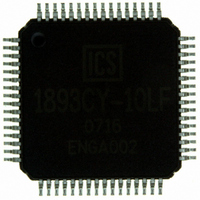ICS1893CY-10LF IDT, Integrated Device Technology Inc, ICS1893CY-10LF Datasheet - Page 18

ICS1893CY-10LF
Manufacturer Part Number
ICS1893CY-10LF
Description
PHYCEIVER LOW PWR 3.3V 64-TQFP
Manufacturer
IDT, Integrated Device Technology Inc
Series
PHYceiver™r
Type
PHY Transceiverr
Datasheet
1.ICS1893CY-10LFT.pdf
(143 pages)
Specifications of ICS1893CY-10LF
Protocol
MII
Voltage - Supply
3.14 V ~ 3.47 V
Mounting Type
Surface Mount
Package / Case
64-TQFP, 64-VQFP
Lead Free Status / RoHS Status
Lead free / RoHS Compliant
Number Of Drivers/receivers
-
Lead Free Status / RoHS Status
Compliant, Lead free / RoHS Compliant
Other names
1893CY-10LF
800-1025
800-1025
Available stocks
Company
Part Number
Manufacturer
Quantity
Price
Company:
Part Number:
ICS1893CY-10LF
Manufacturer:
IDT
Quantity:
469
Company:
Part Number:
ICS1893CY-10LF
Manufacturer:
IDT, Integrated Device Technology Inc
Quantity:
10 000
Company:
Part Number:
ICS1893CY-10LFT
Manufacturer:
IDT, Integrated Device Technology Inc
Quantity:
10 000
4.1.2 Specific Reset Operations
4.1.2.1 Hardware Reset
4.1.2.2 Power-On Reset
ICS1893CY-10 Rev 1/07
This section discusses the following specific ways that the ICS1893CY-10 can be reset:
•
•
•
Note:
Entering Hardware Reset
Holding the active-low RESETn pin low for a minimum of five REF_IN clock cycles initiates a hardware
reset (that is, the ICS1893CY-10 enters the reset state). During reset, the ICS1893CY-10 executes the
steps listed in
Exiting Hardware Reset
After the signal on the RESETn pin transitions from a low to a high state, the ICS1893CY-10 completes in
640 ns (that is, in 16 REF_IN clocks) steps 1 through 5, listed in
first five steps are completed, the Serial Management Port is ready for normal operations, but this action
does not signify the end of the reset cycle. The reset cycle completes when the transmit clock (TXCLK) and
receive clock (RXCLK) are available, which is typically 53 ms after the RESETn pin goes high. [For details
on this transition, see
Note:
1. The MAC/Repeater Interface is not available for use until the TXCLK and RXCLK are valid.
2. The Control Register bit 0.15 does not represent the status of a hardware reset. It is a self-clearing bit
Entering Power-On Reset
When power is applied to the ICS1893CY-10, it waits until the potential between VDD and VSS achieves a
minimum voltage before entering reset and executing the steps listed in
After entering reset from a power-on condition, the ICS1893CY-10 remains in reset for approximately 20
µ s. (For details on this transition, see
Exiting Power-On Reset
The ICS1893CY-10 automatically exits reset and performs the same steps as for a hardware reset. (See
Section 4.1.1.2, “Exiting
Note:
Hardware reset (using the RESETn pin)
Power-on reset (applying power to the ICS1893CY-10)
Software reset (using Control Register bit 0.15)
that is used to initiate a software reset.
ICS1893CY-10 Data Sheet - Release
At the completion of a reset (either hardware, power-on, or software), the ICS1893CY-10 sets all
registers to their default values.
The only difference between a hardware reset and a power-on reset is that during a power-on
reset, the ICS1893CY-10 isolates its RESETn input pin. All other functionality is the same. As with
a hardware reset, Control Register bit 0.15 does not represent the status of a power-on reset.
Section 4.1.1.1, “Entering
Section 9.5.18, “Reset: Hardware Reset and
Reset”.)
Copyright © 2007, Integrated Device Technology, Inc.
Section 9.5.17, “Reset: Power-On
Reset”.
All rights reserved.
18
Section 4.1.1.2, “Exiting
Power-Down”.]
Chapter 4 Operating Modes Overview
Section 4.1.1.1, “Entering
Reset”.)
Reset”. After the
Reset”.
















